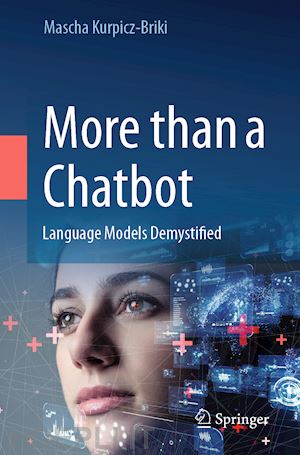

Questo prodotto usufruisce delle SPEDIZIONI GRATIS
selezionando l'opzione Corriere Veloce in fase di ordine.
Pagabile anche con Carta della cultura giovani e del merito, 18App Bonus Cultura e Carta del Docente
Recent technological advances have resulted in a new generation of powerful text processing and generation tools, that produce text very similar to what a human could do. Such tools have the potential to change the way we work, learn and teach – and this book enables you to understand and be part of this exciting development.
Did you wonder how tools like ChatGPT or Bard work, but do not have a technical background? Then this is the right book for you! To discuss and better understand what such technologies are capable of and how this will impact our lives and our society, a basic background knowledge about text processing and generation technologies is required. In particular, the book discusses the following questions: How did the field of automated text processing and generation evolve over the last years, and what happened to allow the incredible recent advances? Are chatbots such as ChatGPT or Bard truly understanding humans? What pitfalls exist and how are stereotypesof the society reflected in such models? What is the potential of such technology, and how will the digital society of the future look like in terms of human-chatbot-collaboration?
The book is aimed for a general audience, briefly explaining mathematical or technical background when necessary. After having read this book, you will be confident to participate in public discussions about how this new generation of language models will impact society. You will be aware of the risks and pitfalls these technologies can bring along, and how to deal responsibly when making use of tools built from AI technology in general.
1. Introduction.- 2. An Introduction to Machine Learning.- 3. Processing Written Language.- 4. Do Chatbots Have Emotions?.- 5. The True and the False.- 6. Stereotypes in Language Models.- 7. The Future of Humans and Language Models.
Mascha Kurpicz-Briki is professor for data engineering at the Bern University of Applied Sciences in Biel, Switzerland, and co-leader of the research group Applied Machine Intelligence. Her research focusses on applying innovative technology to the fields of health and humanities, and on the investigation of fairness questions in natural language processing. In her research, she has been collaborating in several interdisciplinary projects and therefore often translates very technical details into a language understandable to a non-technical public.











Il sito utilizza cookie ed altri strumenti di tracciamento che raccolgono informazioni dal dispositivo dell’utente. Oltre ai cookie tecnici ed analitici aggregati, strettamente necessari per il funzionamento di questo sito web, previo consenso dell’utente possono essere installati cookie di profilazione e marketing e cookie dei social media. Cliccando su “Accetto tutti i cookie” saranno attivate tutte le categorie di cookie. Per accettare solo deterninate categorie di cookie, cliccare invece su “Impostazioni cookie”. Chiudendo il banner o continuando a navigare saranno installati solo cookie tecnici. Per maggiori dettagli, consultare la Cookie Policy.